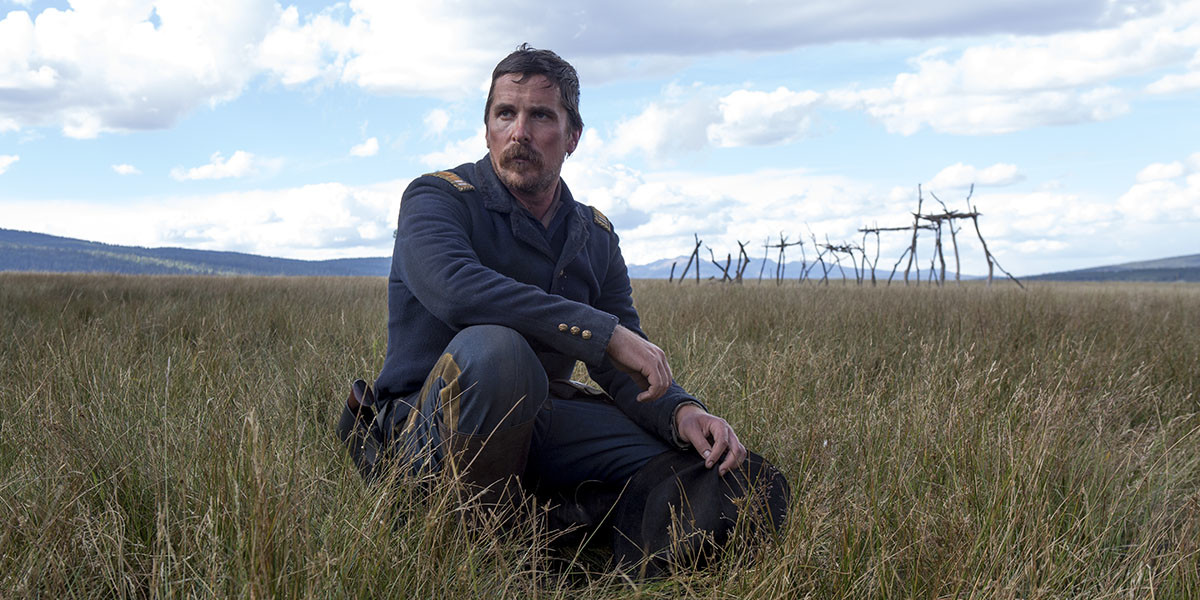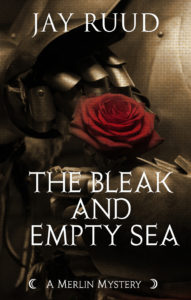Hostiles
Scott Cooper (2017)
[av_image src=’http://jayruud.com/wp-content/uploads/2014/08/Tennyson-180×180.jpg’ attachment=’77’ attachment_size=’square’ align=’left’ animation=’left-to-right’ link=” target=” styling=” caption=’yes’ font_size=” appearance=’on-hov
Hostiles, the new western directed and co-written by Scott Cooper (Crazy Heart, Black Mass), begins with a stark quotation from D.H. Lawrence: “The essential American soul is hard, isolate, stoic and a killer.” While this does seem to sum up a good deal of the movie, and is a pretty good thumbnail sketch of Christian Bale’s character in the film, I can think of another quotation, this one by Native American writer Sherman Alexie, that might be said to encapsulate the theme of the story: “I used to think the world was broken down by tribes….By Black and White. By Indian and White. But I know this isn’t true. The world is only broken into two tribes: the people who are assholes and the people who are not.” It takes Bale’s character the whole film, pretty much, to come to this place, but he does. The thing is, there’s a lot more humor in Alexie’s one sentence than there is in the entire grim 135 minutes of Cooper’s film.
Seriously, and I mean very seriously, Cooper is trying to create a classic epic western in the style of John Ford, but in the revisionist manner of more recent classics like Clint Eastwood’s Unforgiven. Cooper pays direct tribute to Ford by referencing the famous doorway shot that ends the classic 1956 film The Searchers, and indirect homage to Unforgiven in making a film in which, as Eastwood says in Unforgiven, “We all got it coming kid.” Bale’s character, Captain Joseph J. Blocker, is a compilation of Eastwood’s William Munny—an aging killer unsuccessfully seeking to leave violence behind—and John Wayne’s monomaniacal Indian-hating Searcher Ethan Edwards in Ford’s film.
The film opens with a horrific scene of violence as a band of Comanche marauders descend upon a family of homesteaders, mercilessly slaughtering the husband, two young daughters and a baby in his mother’s arms, while the mother Rosalie Quaid (Rosamund Pike of Gone, Girl), still carrying her dead child, manages to elude the raiders and save her life. Such a scene does not elicit sympathy for the plight of Native Americans. The scene cuts to another native man, this one an Apache, being kicked around and tormented by a group of U.S. cavalry, finally being dragged behind a horse while his wife and child look on in terror, and while a mounted Captain Blocker, in command of the troops, looks on stolidly without expression. The Apaches’ crime was escaping from Fort Derringer, New Mexico, in which they have been imprisoned, and Blocker is intent on dragging them back to their confinement. We have just witnessed life on the western frontier of America as Cooper’s film depicts it: a world of violence and enmity.
Blocker, a veteran of a quarter century in this world, a quarter of a century of warfare against Native Americans, bears a hardened hatred of America’s indigenous people it has been his job to dispossess and control for his entire adult life. He has seen atrocities committed by his enemies, and he has taken part in slaughter of his own—at one point one of his old comrades declares Blocker has “taken more scalps than Sitting Bull himself.” And as the film opens, he is about to retire, to enter civilian life. Imagine his surprise, and chagrin, when as his last official assignment as a cavalry officer he is ordered to escort his fiercest enemy, the Cheyenne war chief Yellow Hawk (Wes Studi of Dances with Wolves and Geronimo) and his family from their imprisonment in New Mexico back to their Montana birthplace. Now dying of cancer after years of imprisonment, Yellow Hawk wants to die in his own homeland, and President Harrison has ordered that he be allowed to do so. Blocker wants nothing to do with the assignment, but, threatened with losing his pension, he finally, but resentfully, agrees.
He starts out with a company consisting of a brand new lieutenant named Kidder (Jesse Plemons, also currently in The Post), a master sergeant named Metz (Rory Cochrane, who was also in Cooper’s Black Mass) who has been with Blocker for some twenty years, an African-American corporal named Woodson (Jonathan Majors, from the TV miniseries When We Rise) who in some ways is Blocker’s conscience, and an immigrant Private Philippe DeJardin (Timothée Chalamet, currently also appearing in Call Me by Your Name and Lady Bird). With Yellow Hawk are his son Black Hawk (Adam Beach, who starred with Studi in the TV production of Bury My Heart at Wounded Knee) and Black Hawk’s wife Elk Woman (Q’orianka Kilcher, who worked with Bale in The New World) and their young son Little Bear (Xavier Horsechief), as well as the chief’s daughter Living Woman (Tanaya Beatty from TV’s The Night Shift). Despite the free passage they have received from the president, Blocker insists on treating the Cheyenne as prisoners, and puts chains on Yellow Hawk and Black Hawk.
Not long into the journey, the group comes across the widowed Mrs. Quaid, alone and in shock in her burned-out home, still clutching her dead infant while the bodies of her family lie all around. The detail members have no choice but to bring her along with them, though her first sight of the Cheyenne family paralyzes her with fear. Still, she is ultimately able to see the difference between this family and the marauders that killed her own people. In this way her story arc parallels Blocker’s.
Later, stopping at a fort along the way, the group picks up another new member—a cavalry sergeant named Wills (Ben Foster of Hell or High Water), who needs to be escorted to his execution at the next fort, not far out of the way for Blocker and his group. Wills proves to be something of an alter ego for Blocker—in the unrepentant Wills he can see something of himself, and though Wills insists on their likeness, Blocker will not acknowledge it. At the same time, Sergeant Metz, tortured by his own years of killing and atrocities, has difficulty keeping on in this life, while Blocker denies the need for such regrets.
The captain first realizes the error of his ways when the group is attacked by the same Comanche who killed Mrs. Quaid’s family, and sees how Yellow Hawk and Black Hawk try to help despite their hands being chained. As the journey progresses, and the group must take action against a group of white outlaws, Blocker, as the audience probably expects, begins to feel a kinship even with the chief who has been his greatest enemy. To say much more would need a spoiler alert, but let me just say that Blocker is successful in getting Yellow Knife to his Montana home to die, but the violence and loss that the journey finally entails makes me wonder how the journey can possibly be justified. The violent world that we saw at the beginning continues, and blocker’s change of heart may be the only good that comes of it. Nor does the change of heart affect any change on the culture of violence.
Thematically, then, it’s difficult to see what the story means. It is a grim world and the survivor is the one best able to respond to violence with deadly force. It’s a joyless world and it’s hard to feel in the end that this world has any meaning. But I admit, that is a point of view that deserves consideration. This is a film that looks fantastic: The sunlit western vistas are often breathtaking. Pike is remarkable as the shattered woman who finds her way back, somehow, to a worthwhile life. Bale is his dark and stoic warrior self, showing significant emotion by a flick of his eyelid. The Native Americans are presented with respect, though they are really not allowed to become full characters: Studi is also a dark and stoic warrior, but one who has a lot less space for character development. But it is not his story, it’s Blocker’s. Hostiles—and the irony of the title is that everybody in this world is hostile—does not quite reach the heights of the classic western Cooper is aiming for, but it’s a pretty good attempt. Three Tennysons for this one.
NOW AVAILABLE:
If you like these reviews, you might enjoy Jay Ruud’s most recent novel, now available from the publisher at https://encirclepub.com/product/the-bleak-and-empty-sea/. Also available from Amazon or Barnes and Noble.
When word comes to Camelot that Sir Tristram has died in Brittany of wounds suffered in a skirmish, and that his longtime mistress, La Belle Isolde, Queen of Cornwall, has subsequently died herself of a broken heart, Queen Guinevere and her trusted lady Rosemounde immediately suspect that there is more to the story of the lovers’ deaths than they are being told. It is up to Merlin and his faithful assistant, Gildas of Cornwall, to find the truth behind the myths and half-truths surrounding these untimely deaths. By the time they are finally able to uncover the truth, Gildas and Merlin have lost one companion and are in danger of losing their own lives.
Order from Amazon here: https://www.amazon.com/Bleak-Empty-Sea-Tristram-Mystery/dp/1893035735/ref=sr_1_1?s=books&ie=UTF8&qid=1503328086&sr=1-1&keywords=Bleak+and+Empty+Sea
Order from Barnes and Noble here: https://www.barnesandnoble.com/w/the-bleak-and-empty-sea-jay-ruud/1126958139?ean=9781893035737


